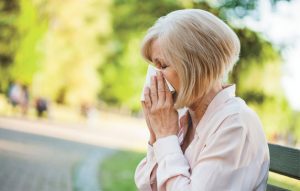

Allergy season is in full swing! Many people will experience allergies from different sources, such as pollen, dust or even stress.
An allergic response occurs when antibodies mistakenly identify a harmless substance, such as tree pollen, as an invader. Antibodies attach to the allergen to protect your body from the substance.
The chemicals released by your immune system can lead to allergy signs and symptoms, such as nasal congestion, runny nose, itchy eyes or skin reactions. This same reaction also affects the lungs and airways for some people, leading to asthma symptoms.
Allergies and asthma are treated differently
Most treatments are designed to treat either asthma or allergic rhinitis, also known as seasonal allergies. But a few treatments help with both conditions. Some examples of treatment include:
• Leukotriene modifier. This type of medication can ease both seasonal allergies and asthma symptoms. It is a daily pill that helps control immune system chemicals released during an allergic reaction. Montelukast, known as Singulair, is the leukotriene modifier that can treat asthma and seasonal allergies.
• Allergy shots (immunotherapy). Allergy shots can help treat asthma by gradually reducing your immune system response to certain allergy triggers. Immunotherapy involves getting regular injections of a tiny amount of the allergens that trigger your symptoms.
Your immune system builds up a tolerance to the allergens over time, and your allergic reactions diminish. In turn, asthma symptoms decrease as well. This treatment generally requires regular injections over a set amount of time.
• Anti-immunoglobulin E (IgE) therapy. When you have an allergy, your immune system mistakenly identifies a substance as harmful and releases antibodies, known as IgE, against the culprit allergen.
The next time you encounter that allergen, the IgE antibodies sense it and signal your immune system to release a chemical called histamine, and other chemicals, into your bloodstream. The medication Xolair interferes with IgE in the body and helps prevent the allergic reaction that triggers asthma symptoms. This treatment is typically used for more severe allergic asthma.
You may need other medications to treat allergies or asthma, especially if your symptoms sometimes worsen. However, recognizing and avoiding the substances that trigger your symptoms is an important step you can take.
Risk of allergic asthma
A family history of allergies is a major risk factor for allergic asthma. Having hay fever or other allergies also increases your risk of getting asthma.
During an asthma attack, the airways become swollen and inflamed. The muscles around the airways contract and the airways produce extra mucus, causing the breathing (bronchial) tubes to narrow.
During an attack, you may cough, wheeze and have trouble breathing. Symptoms of a minor asthma attack get better with prompt home treatment. A severe asthma attack that doesn’t improve with home treatment can become a life-threatening emergency.
Recognizing and treating an asthma flare-up early is the key to stopping an asthma attack. Be proactive and follow the treatment plan you created with your doctor. Your treatment plan should include what to do when your asthma starts getting worse, as well as how to deal with an asthma attack in real-time.
Allergies do not cause all asthma
Though allergic asthma is very common, there are other types of asthma with different kinds of triggers. Exercise, infections, cold air, acid reflux, or stress can provoke some people’s asthma. Many people have more than one kind of asthma trigger.
Getting symptoms under control
Know what triggers your allergy and asthma symptoms and learn how to limit your exposure to them. Work with your doctor to find the best treatment to manage your symptoms, and check in with them regularly.
Because allergy and asthma symptoms can change over time, you may need to adjust your treatment accordingly. Learn the signs that your asthma may be flaring up, and make sure that you know what to do when it does.
Allergy shots
Allergy shots are regular injections over a period of time — usually three to five years — to stop or reduce allergy attacks. Allergy shots are a form of treatment called immunotherapy. Each allergy shot contains a small amount of specific substances that trigger your allergic reactions. These are called allergens. Allergy shots contain enough allergens to stimulate your immune system — but not enough to cause a full-blown allergic reaction.
Your doctor steadily increases the dose of allergens in each of the allergy shots. This helps get your body used to the allergens. Your immune system then builds up a tolerance to the allergens, causing your allergy symptoms to slowly diminish.
Contact IntuneHealth
If you’d like to speak to a trusted healthcare professional about how allergies can affect your life, contact IntuneHealth today! At IntuneHealth, we provide proactive, preventive primary care designed to keep you healthy.
IntuneHealth takes the hassle out of care by giving you direct access to your PCP, a personal care team coordinating all aspects of your wellness, and an all-in-one app to manage your health. From same-day and virtual visits to in-office and at-home appointments, access to care is conveniently available when and where you need it. Schedule an appointment today to meet your new partner in health.
Intune Health
A new approach to primary care for those with a Medicare Advantage plan.
(239) 790-1122 | IntuneHealth.com
11600 Gladiolus Drive, Suite C17
Fort Myers, FL 33908
 Southwest Florida's Health and Wellness Magazine Health and Wellness Articles
Southwest Florida's Health and Wellness Magazine Health and Wellness Articles

